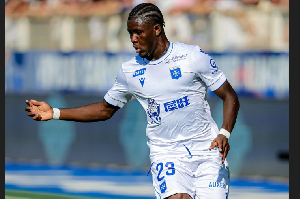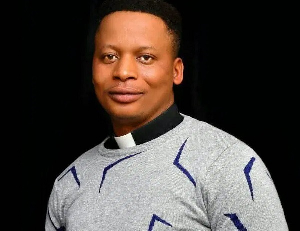Dr. Papa Kwesi Nduom, 2012 flagbearer of the Progressive People’s Party (PPP) has attributed causes for the nation’s poverty to “mismanagement, corruption, laziness, envy, well-meaning but poor leaders, and an attitude that says we should look for the best people and tear them apart, pull them down syndrome.”
He said this on Ghana’s premier internet-based radio www.hedjorleonlineradio.com and on Ahomka FM in the Central Region last Saturday December 14, 2013; when he hosted his weekly programme, Ghana, Great and Strong.
He however said that incorruptible, well-performing leadership will make Ghana, Great and Strong.
“We are a lucky people, perhaps a chosen people. If we can lift up our game, make sure our leaders care and work to strengthen the weakest ones and reward the self-starters and hardworkers, we can create paradise on earth on this land we call Ghana.”
Dr. Nduom was of the belief that this attitude has contributed to Ghana’s inability to develop successful proposals to attract new grant money from the Millennium Challenge Account.
It will be recalled that in August 2006, Ghana signed for the first compact for an amount of $547 million, making it the third biggest beneficiary of the compact in the world after Tanzania ($698 million) and Morocco ($697million).
The five-year compact came into force February 16, 2007. The agricultural sector was the main focus followed by the transportation sector as well as rural development. In September 2012, the Ghana government held talks in Accra with a delegation from the MCC to speed up modalities for the second compact of the Millennium Challenge Account (MCA).
“The MCA Ghana programme has worked for the most part because it was designed to solve the normal problems we encounter in Ghana and was modelled after successful Authorities in other parts of the world, and we took inspiration from the Volta River Project that brought VRA, the Akosombo dam, Valco, etc.
I led the process and I led by learning from other people’s successes and failures. With an authority MiDA set up by an Act of Parliament, we made sure the project would be relatively free of interruption and interference. We also made sure government could not touch the grant money of $547 million. Unfortunately, there are reports that government failed to provide some of the counterpart funds needed for some support activities.”
Dr. Nduom again questioned why parliament passed another bill to establish the Savannah Accelerated Development Authority (SADA) especially when MiDA was doing well.
The former PPP flagbearer revisited the 2012 elections looking at the subject of education, kindergarten to senior high school.
“During her vetting by Parliament, the new Minister of Education, Prof. Naana Jane Opoku-Agyeman when asked of her thoughts about the ongoing debate about free education for Senior High School students, said the question should not be free or fee paying, the overriding factor should be the outcome…whether education at the second cycle level is free or not, the question that we should ask ourselves is: are we getting what we want? That should be our concern.”
He however stated that the problem of the shortfall in the training of Science-based professionals should rather be tackled from the basic schools, where some teachers lacked the requisite knowledge to develop the interests of pupils to offer the Sciences at higher levels of education.
He recounted how Barack Obama’s administration is making Science a priority in America and was hopeful committed leadership in Ghana can do everything to change the country’s future.
According to him, he felt that Ghana could do better if almighty America was prioritizing kindergarten education.
On fuel price increment, Dr. Nduom said: “when we discuss pricing of water, fuel, electricity, politics comes in to blunt the force of our arguments or prevent us from knowing the truth and making decisions to solve the problems we face. Obviously, at any point in time, we have a President who is the leader of government and who belongs to a political party.”
“When we criticize decisions made by this and other such leaders, we should strip him of his political party garment and deal with the matter at hand. That is what we want to do today.
We must all understand one thing. As energy goes, so goes the economy and the nation. So when we get the energy policy wrong, the economy suffers, the nation suffers. When politicians are afraid of the people so they do not do what they want done and in this case raise fuel prices and so pile it up and wait until they get desperate and all of a sudden hit the people with steep price increases. When that happens, it is a failure of leadership.
The shock goes through the entire system, the economy and the nation. And it is the poor that suffers the most. And this is happening today in Ghana. Deregulation of the petroleum sector is the policy accepted by both the NPP and the NDC. Until this is changed, there needs to be a better approach to implementing this policy so we do not continue to introduce shocks into the system from time to time. If this policy stays, prices can not only go up, they must also come down when conditions are right. Countries that practice deregulation experience price movements up and down,” he advised.
He again touched on the Achimota Melcom disaster that left 14 people dead. He said that many things were said, promises were made and the government authorities promised to get to the bottom of the disaster and punish those found to have done wrong things and put in preventive measures but wondered if something has actually been done to prevent other disasters from taking place.
“We have many issues, many problems, most, difficult to understand situations in Ghana indeed we have many rivers, mountains and valleys to cross,” he said soberly.
General News of Tuesday, 17 December 2013
Source: Today Newspaper
Ghana is poor because of corruption, laziness - Nduom













